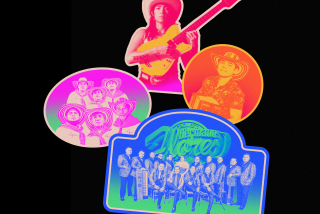Musician Nati Cano dies at 81; leader of Mariachi los Camperos
Nati Cano was 7 when he started playing mariachi music in a group with family members in Mexico. He loved the music but didn’t care for the life.
“We’d play saloons, and I remember one day playing for one guy and he decided not to pay us,” Cano said in a 1993 Los Angeles Times interview.
The group ended up walking home, not even having been fed. The incident made a big impression on the young musician, who dedicated much of his life “to get the mariachi out of the cantinas.”
Cano, 81, whose famed Los Angeles-based group Mariachi los Camperos de Nati Cano played top concert venues around the world and won crossover fans with its performances with Linda Ronstadt, died at his home in Fillmore on Friday. The cause was colon cancer, said his daughter, Alejandra Cano.
Mariachi los Camperos, widely considered one of the top mariachi ensembles in the country, played Disney Hall, the Orange County Performing Arts Center, Carnegie Hall, Lincoln Center and the Kennedy Center among numerous other venues.
On tour and at home, the group would sometimes play time-worn hits associated with Mexican music, but Cano — who created the arrangements for much of the music the ensemble performed — refused to stick only to the tried and true.
At a 1996 concert at the Orange County theater, he called out to the audience, “Do you all know ‘La Bamba’?”
“Yes!” came the reply from the crowd.
“Well, we’re not going to play it,” Cano said. “There’s more to Mexican music than ‘La Bamba.’”
Concert performances might include adaptations of pieces written for orchestras in Mexico or Cano’s own compositions, influenced by events in his life.
Though a warm, smiling presence on stage, Cano could be a strict disciplinarian with his group in order to get the sound and look that he wanted.
“His aim was to get mariachi away from the stereotype of guys just getting together to perform, not very well and maybe in outfits that didn’t match,” said a longtime member of the ensemble, Sergio Alonso, in an interview on Saturday. “He wanted polished performances, with everyone playing with discipline and pride. And everyone had to look sharp.”
“He was a romantic, idealistic artist.”
Even though he drilled the musicians, he didn’t seek to homogenize the music. Cano, who lectured on ethnomusicology at UCLA, wanted to preserve the almost mysterious flavor of mariachi.
“The mariachi plays kind of imperfect, and for a musician not used to it, it is difficult because it is imperfect,” he told The Times in 1990. “If you just write it on a sheet, it is impossible to interpret, because it comes from a style way back.
“You almost have to be born with it,” he said. “I’m not sure you can learn it at a university.”
Natividad Cano was born June 23, 1933, in Ahuisculco, a village in the Mexican state of Jalisco. His relatives were day laborers who played mariachi music on the side.
Nati’s grandfather, Catarino Cano, taught him to play the vihuela, a guitar-like, stringed instrument. He later enrolled in the Academia de Musica in Guadalajara, the capital of Jalisco, where he studied the violin for six years, according to an account by the National Endowment for the Arts, which named Cano a National Heritage Fellow in 1990.
In 1950, Cano traveled to Mexicali, where he joined a mariachi group, soon becoming the group’s arranger though he was much younger than the other musicians. The group moved on to Los Angeles and when the leader died in a car crash, Cano took over, renaming the ensemble Los Camperos, meaning the Countrymen.
Out of his anger that he had been refused service in a Texas restaurant while on tour because he was Mexican, Cano vowed to one day have a restaurant of his own. He opened La Fonda on Wilshire Boulevard in 1969. His group performed there and it became a hangout for people interested in the music, including Ronstadt.
She featured Mariachi los Camperos on her 1987 album “Canciones de Mi Padre” and its 1992 sequel “Conciones de Siempre.”
Mariachi Los Camperos’ 2008 album, “Amor, Dolor y Lagrima,” won the Grammy for best regional Mexican album.
The restaurant closed in 2007, and eventually Cano stepped down as leader of the group, though he sometimes toured with them despite being quite ill.
“He would come out on stage and people would love to see him,” Alonso said.
In addition to his daughter Alejandra, Cano is survived by his wife, Andrea; and another daughter, Natalie, all of Fillmore.
[email protected]
Twitter: @davidcolker
More to Read
Start your day right
Sign up for Essential California for the L.A. Times biggest news, features and recommendations in your inbox six days a week.
You may occasionally receive promotional content from the Los Angeles Times.







